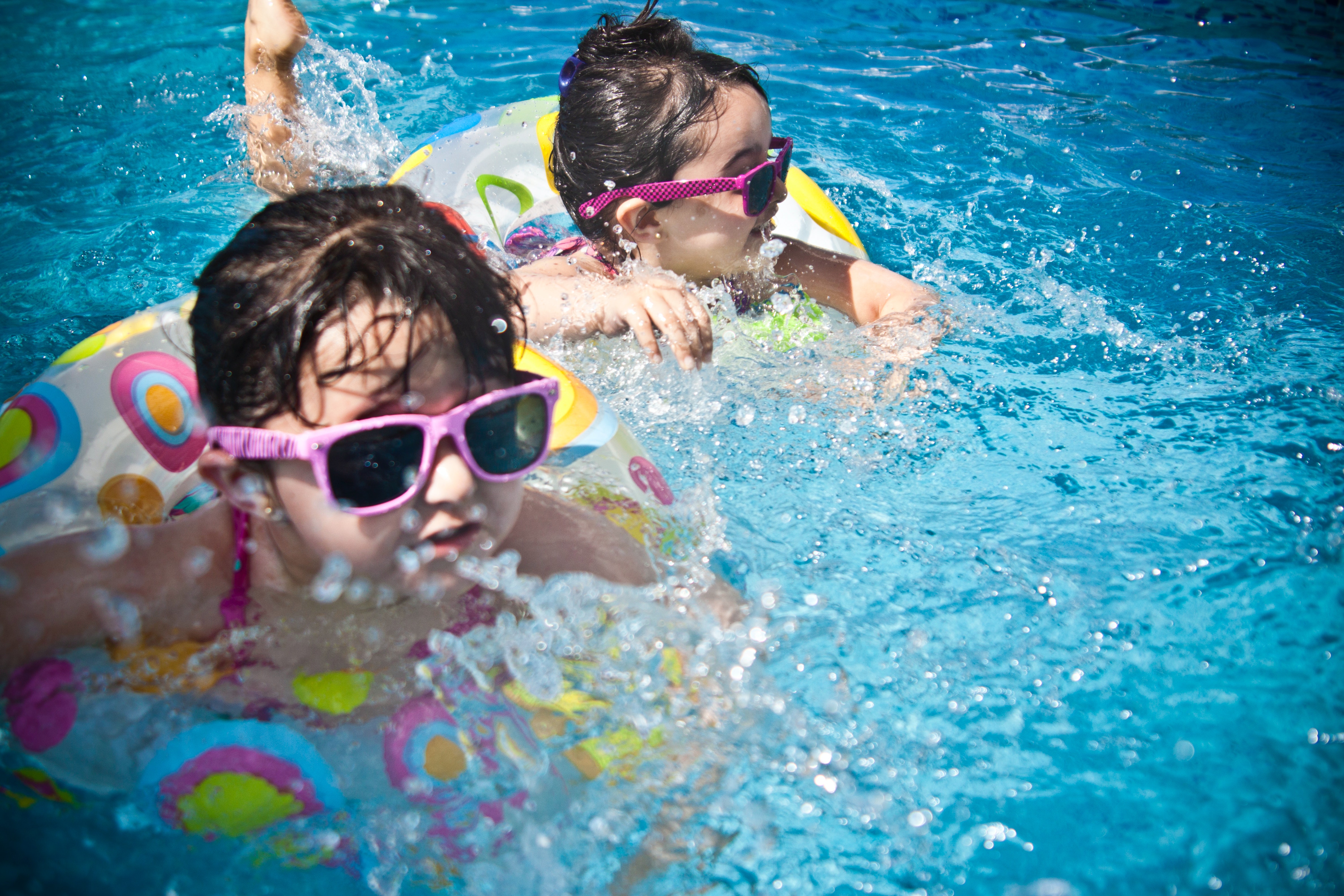
Keep your summer going swimmingly.
Swimming in a pool or spa is refreshing and relaxing. That it, until your eyes begin to burn and your skin itches; a clear sign that something is off in your pool. Balancing and treating a pool to keep it santized, safe, and comfortable is the bane of every pool and spa owner. However, it doesn't have to be! Go beyond testing with just a test kit!
Chlorine
Swimming pools and spas require continuous sanitation to prevent the growth of algae and kill harmful bacteria. The most common type of sanitizer used to treat pool and spa water is chlorine.
Chlorine is a strong oxidizer, but other oxidizers such as bromine and iodine are also used for pool and spa disinfection. Depending on the pH level, chlorine will be present as hypochlorous acid (HOCl), the most effective form for sanitization, or as the less effective hypochlorite ion (OCl¯). Chlorine will be present in greater concentrations as hypochlorous acid below pH 7.6; above this pH, hypochlorite is favored. Chlorine can also combine with other molecules present in the water; when it combines with ammonia, chloramines are formed, which are virtually ineffective at sanitizing and responsible for producing the familiar and unpleasant chlorine odor.
pH, Chlorine (or ORP) and Temperature
Since the form of chlorine present is pH-dependent, the pH should be balanced at an appropriate level to maximize sanitizing effectiveness and ensure swimmer comfort. Ideal pH levels are typically between 7.2 and 7.6; pH levels above this greatly reduce the effectiveness of chlorine sanitizers, and pH levels below this can cause skin and eye irritation. In addition to pH, the concentration of the sanitizer present should also be measured. Chlorine concentration can be measured as either free chlorine (chlorine available for active disinfection) or total chlorine (combined chlorine that is no longer available for disinfection, in addition to free chlorine).
Ideal chlorine concentrations vary depending on the conditions in the pool or spa. Chlorine will break down when exposed to UV light. To stabilize chlorine in the presence of UV light, cyanuric acid may be added to outdoor pools. However, high cyanuric acid levels can also lower the sanitation power of chlorine.
Another consideration is temperature. Microorganisms grow more rapidly at higher temperatures, so the required sanitization level for a swimming pool or spa is highly dependent on the water temperature; this is especially concerning for heated pools and spas. A general rule of thumb is that for every 5.5°C or 10°F increase in water temperature over 27°C (80°F), the concentration of required sanitizer is doubled.
What Is The Right Amount Of Chlorine?
While free chlorine is a measure of the quantity of available chlorine present in pool and spa water, other water properties may affect the ability of that chlorine to properly disinfect. A sufficient concentration of free chlorine may be present in solution, but based on certain properties it may not be effectively sanitizing. Oxidation-reduction potential (ORP) directly measures how strong the oxidizing potential in a solution is, thus determining the sanitation effectiveness.
Two pools with the same free chlorine concentration may have completely different ORP values based on pH, cyanuric acid concentration, and temperature. Therefore, ORP is the best indication of how effectively the pool or spa water is being sanitized. While optimal concentration levels vary based on the type of sanitizer being used, the ORP level should be maintained above 650 mV for pools and spas treated with chlorine, bromine, or iodine.
Testing Success

A swimming pool and spa service technician contacted a Hanna Instruments sales representative for a way to measure water quality in their customers’ pools and spas. The customer had colorimetric tests for measuring chlorine and bromine concentrations, and wanted to upgrade from a colorimetric pH test to a pH meter and electrode.
The technician was also interested in learning more about using ORP to monitor disinfection. The sales representative recommended the pH/ORP/Temperature Combo Tester - HI98121. The customer was pleased with the convenient pocket-sized design and simple, two-button operation. They were relieved to learn that the meter is equipped with a completely waterproof housing that is designed to float in water, allowing for worry-free use even in pools with deep ends.
The multiparameter capability of the HI98121 to measure pH, ORP, and temperature allowed the technician to quickly assess and make proper adjustments to maximize sanitizer effectiveness for both indoor and outdoor, and heated and unheated pools and spas. The 0.01 pH resolution and ±0.05 pH unit accuracy and 1 mV ORP resolution ±2mV accuracy gave the technician confidence in the measurement and prescribed treatments. The replaceable pH electrode was also convenient for inexpensive yearly maintenance. Overall, the HI98121 provided a comprehensive solution and great value for their pool and spa testing needs.
Peace of Mind
.jpg)
If the technician was looking for in-place monitoring and control of the pools, a Pool Line Pool Controller would be the best choice. The ORP Controller and Dosing Pump BL101 takes care of monitoring and dosing chlorine, while the pH Controller and Dosing Pump BL100 monitors the pH and doses the pool appropriately. These two controllers help to maintain the optimal pool sanitation levels to ensure a safe and happy pool season!
.jpg)
Want To Connect To The Cloud?

Maintaining pools and spas is even easier if you can keep track of your pH and chlorine wherever you are. Keeping track of multiple facilities? You can do that too! The Hanna Cloud Connectivity with the BL122 and BL123 allows you to automatically control key safety parameters, without worry.
Got Questions?
For more information regarding how Hanna Instruments can help you with your pool needs, contact us, as sales@hannainst.com or 1-800-426-6287.
That's why we've dedicated our blog as a helpful resource for you to use! Catch up on the latest products, explore industry trends, discover testing tips, learn how to improve results, and more. Got questions? Email sales@hannainst.com.

